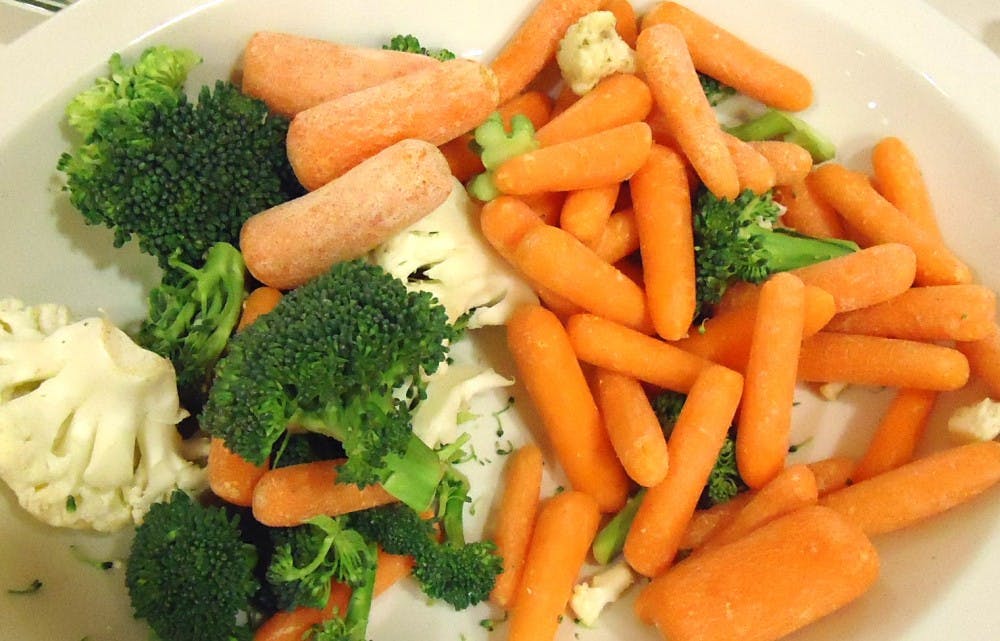According to a 2012 Gallup Poll, five percent of Americans self-identified as vegetarian and another two percent as vegan. While people may choose vegetarianism or veganism for a number of reasons, a study of vegetarianism by the National Institutes of Health revealed that people often choose the lifestyle for religious or ethical reasons, environmental concerns and the health benefits of a plant-based diet.
According to Melanie Brede, registered dietician in the Office of Health Promotion at Elson Student Health, there are a variety of health benefits associated with a well-balanced vegetarian or vegan diet, including reduced risk of cardiovascular diseases. Furthermore, the NIH states that vegetarian and vegan diets can lower the risk of developing high blood pressure, diabetes and certain cancers.
“For example, a diet rich in potassium, magnesium and calcium and low in sodium is associated with healthy blood pressure,” Brede said. “Food sources of these nutrients include fruit, vegetables, nuts, seeds and low-fat dairy products. Additionally, it is helpful for cholesterol management to minimize saturated and trans fats and replace them with unsaturated fats. Replacing butter with olive oil, avocados and nuts is one way to do this.”
However, Brede said a poorly-balanced vegetarian diet may be lacking in protein, calcium, vitamin B-12, vitamin D and iron. Vitamin B-12 is found only in animal products, so vegans are advised to take a supplement. Iron-deficiency anemia can also be a problem among vegetarians, since iron is more easily absorbed from meat products than plant products.
“Vegetarians, especially females, would do well to have a medical check-up that includes checking iron status,” Brede said. “Iron-deficiency anemia causes fatigue and can be most effectively corrected with supplements. However, iron supplements are not recommended unless deficient, because excess iron is toxic.”
In addition to being a healthy lifestyle choice, vegetarianism and veganism are also popular because of environmental benefits, which include a lower carbon and water footprint.
According to Reilly Park, member of animal rights CIO Animal Justice Advocates and fourth-year College student, choosing a plant-based diet is one of the most significant influences individuals can have on the environment.
“Animal agriculture requires a massive amount of water, feed and transportation resources to meet the high demands of humans' dietary patterns — which, as demand increases and the environment consistently becomes depleted, is unsustainable, no question,” Park said. “Cows produce 100 kilometers of methane each year, which is the equivalent to a car burning 235 gallons of gas. With that fact in mind, imagine how much less of a negative impact choosing plants over animals has on the environment with each meal.”
Furthermore, Park said animals account for 18 percent of greenhouse gas emissions, greater than the percentage associated with transportation.
In addition to carbon footprint, meat production also has a large water footprint. According to Park, beef production requires 1,847 gallons of water per pound of meat.
Environmental costs of meat production can extend beyond direct production costs as well. Runoff from animal agriculture productions can cause E. coli contamination of food and resulting E. coli outbreaks.
“The runoff, much of which is feces from animals, as well as antibiotics given to them to sustain them in the abusive, putrid environments they subsist in, seeps into our drinking water, crops and overall environment — which makes humans sick and damages ecosystems,” Park said.
While plant-based foods may seem like the more sustainable option, soybeans — the source of the major vegetarian protein tofu — have a relatively high water footprint compared to other plants, according to The Water Footprint Network.
However, the environmental costs of such a high-impact plant product are still less than those associated with meat products, Park said. Animals’ carbon dioxide emissions and the additional environmental costs of growing animal feed contribute to the almost universally higher costs of raising animals as compared to growing plants.
“Practicing veganism is about more than our tastebuds,” Park said. “When you choose to eat plants, you're choosing to protect the planet's water, air, soil, animals and your health.”







